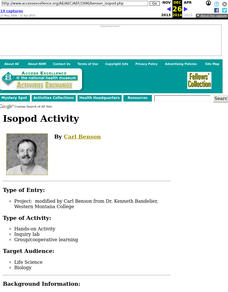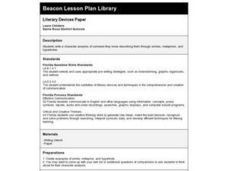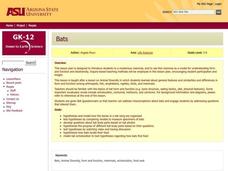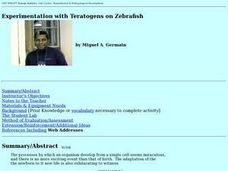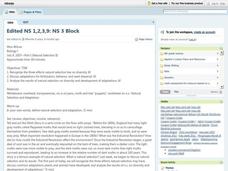Curated OER
Problem Solving
Learners use hockey sticks to pick up bean bags and put them into hoops which they get money for in the end. In this movement and math lesson plan, students get fake money and add up how much they earned in the end based on how many...
Curated OER
Isopod Activity
Students enter information and compare relationships that they are measuring.
Curated OER
Why Walk?
Following the story Yummers, pupils will use the food pyramid to evaluate what Emily Pig ate during her walk and find out why her walk made her sick. They will then participate in a walking game.
Curated OER
Rx Rainforest:
Students identify plant diversity in the rainforest and the role that animals and habitats play in scientific research. They differentiate between natural habitat and laboratory research and work collaboratively to produce a video news...
Curated OER
A Natural Habitat: What, How and Why
Students understand what a habitat is. They determine why a habitat is important to our environment no matter where it is located. Students observe and recognize natural habitats in their surroundings.
Curated OER
Literary Devices Paper
Fourth graders write a character analysis of someone they know describing them through similes, metaphors, and hyperboles. They may include themselves and how their person relates to him or her.
Curated OER
Convince Me!
Middle schoolers analyze advertisements meant to persuade a reader to purchase a certain product or service to find out what stands out about the ad or what it is about the ad that persuade readers. They complete an analysis chart, and...
Curated OER
Bats
Students model how the bones in a bat wing are organized. They develop questions about bat body parts based on photographs. They hypothesize how bats locate their food.
Curated OER
Plants and Animals of Great Bay Animals and Plants of the Estuary
Students participate in a webquest about the plants and animals that inhabit an estuary. They role play as environmentalists researching this habitat and present the results of their research in a creative way.
Curated OER
Japan and The Ring of Fire
Middle schoolers engage in a study of the volcanic forces and earthquakes associated with The Ring of Fire in the Pacific Ocean. The people of Japan are researched in how they have dealt with living in the area. Also students write in...
Curated OER
Amazon Rainforest
Seventh graders complete a simulation in which they travel through the Amazon rainforest. Using their map skills, they determine the best route and where to see specific plants and animals. They develop their own database to organize...
Alabama Learning Exchange
Going Batty
Second graders participate in a research project involving bats. They collect information for their project on the Internet and other educational sites. They participate in a field trip to discover more about bats at the zoo.
Curated OER
Desert Biome
Students examine the vocabulary of desert animals and observe pictures of the animals as they name them. As a class, students compare and contrast the characteristics of desert animals. Using a specified website, students match...
Curated OER
Design-A-Weed
Students create a "super weed" that prospers in teh harsh conditions on plant Weediv. They comprehend how weed adaptations give the plants an advantage over native plants. Students define the term adaptation. They give three examples...
Curated OER
Lake and Pond Study
Learners examine the habitat and community structure of a pond that could support Ospreys through games and worksheets. They then go on a field trip to a pond to evaluate the suitability of the pond as an Osprey habitat.
Curated OER
Coqui Frog Camouflage
Students investigate the concept of the coqui frog of Puerto Rico. They conduct research using a variety of resources. Students explain in oral or written form some of the characteristics to that identify the frog. The lesson includes...
Curated OER
Experimentation with Teratogens on Zebrafish
High schoolers compare mitosis and meiosis with regard to chromosome number in parent cells versus daughter cells, types of cells produced, total number of cells produced, and the number of divisions. In groups, identify and...
Curated OER
VERTEBRATES
Seventh graders describe the main characteristics of warm-blooded vertebrate animals. They compare and contrast the two different groups of warm-blooded vertebrate animals by looking at external, reproductive, and growth characteristics.
Curated OER
Population Density
Students use the scientific method to conduct an experiment and use varied methods to gather background information. They correctly use lab equipment and prepare tables and graphs that organize, conclude, and present their findings. ...
Curated OER
Ecology 8 Land Biomes
High schoolers identify and describe the main features of one land biome. After researching what a biome is, they give various examples of biomes around the world and in their backyards.
Curated OER
Natural Selection And Evolution
Students investigate the concept of evolution and how natural selection is used as an indicator that evolution has happened. They recognize the three effects it has on diversity and how adaptations can develop. Diversity is explained as...
Curated OER
Humane Science Projects
In this science worksheet, learners examine the list of possible science projects. They look for the characteristics that set apart these ideas as humane.
Curated OER
A Monument to Value
Students build a monument to represent trustworthiness. In this trustworthiness lesson plan, students discuss traits related to trustworthiness, suggest images that represent trustworthiness, and build a monument with those images.
Other popular searches
- Animal Behavior Experiments
- Wild Animal Behavior
- Animal Behavior in Termites
- Animal Behavior of Fish
- Domestic Animal Behavior
- Animal Behavior Lesson Plans
- Biology Animal Behavior
- Animal Behavior Labs
- Animal Behavior Lab Betta
- Dance and Animal Behaviors
- Animal Behaviors Betta
- Innate Behavior Animal



